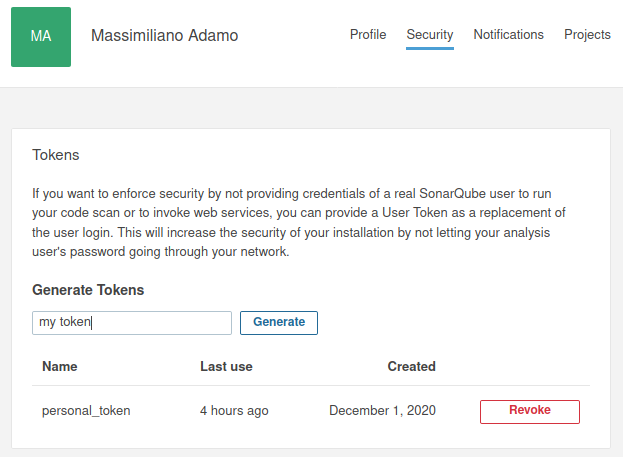Introduction: GÉANT Project GitLab
GitLab is an open-source code hosting platform for collaboration and version control. It can be installed on your servers to host your codes privately. GitLab provides Source Code Management (SCM) functionality similar to GitHub and BitBucket.
...
For the correct trigger of the SonarQube task, GitLab CI uses a "runner" that is already configured in our GÉANT Project GitLab deployment. Momentarily the runner is configured as a "shared" process (shared runner). This means that one runner is used to trigger the SonarQube analysis for all GitLab projects that use the CI/CD pipeline. For this, the runner queues all incoming requests and works on them in a sequential way. In the past, not many projects were using SonarQube at the same time. Therefore, we assume that momentarily the usage of the "shared runner" will have no impact on the processing time of your project in SonarQube.
Prerequisites
Create a token in SonarQube
You need to have a token to authorize the CI against SonarQube. In fact, the CI must be able to push the outcome of the scan to SonarQube.
...
You can create a personal token under the security settings of your SonarQube account (My Account → Security):
Set up your project in the GÉANT deployment of GitLab
Create your project in the GÉANT Project GitLab deployment.
...
The tag name is "sonarqube" and the runner is intended to be a Docker runner.
Configure your GitLab Project
To enable GitLab to automatically execute the CI/CD runner, some variables need to be defined. Some of them had already been set on a global ("system") level, others must be set by your project.
Global Variables
The following two variables are required. They are already set up globally in GitLab, so that you don't need to define them again.
- SONAR_HOST_URL = https://sonarqube.software.geant.org
- SONAR_SCANNER_CLI_VERSION = 4.6
Project Variables
The user will have to set a token variable at the project level (Settings → CI/CD → Variables → Add Variable - it is recommended to use a "masked" type of variable).
...
| Note | ||
|---|---|---|
| ||
The value of SONAR_LOGIN must be identical to the value of the SonarQube token as defined in Step 2.1 Create a token in SonarQube. |
Create the file .gitlab-ci.yml
The file that is responsible to define the appropriate list of tasks that need to be executed after a "git push" is the file .gitlab-ci.yml. This file must be placed in the root directory of your project.
...
| Code Block | ||||
|---|---|---|---|---|
| ||||
---
stages:
- sonarqube_stage
sonarqube_ci_stanza: # free name
image: sonarsource/sonar-scanner-cli:${SONAR_SCANNER_CLI_VERSION}
stage: sonarqube_stage # free name
variables:
SONAR_PROJECT_BASE_DIR: "$CI_PROJECT_DIR"
script:
- /usr/bin/entrypoint.sh sonar-scanner -Dsonar.projectKey="$CI_PROJECT_NAME" # sonar.projectKey defines the name of the project in SonarQube.
# In this example it uses the same name of the project in GitLab.
tags: # NOTE: this is NOT a git tag name.
- sonarqube # It is a GitLab tag associated in the runner section (see Step 3.
# Setup your project in the GÉANT deployment of GitLab)
|
GitLab CI extra settings
The CI will trigger SonarQube on each event by default (commit to every branch, tags creation, merge...). It's up to the user to limit the triggers for the CI or skip the CI on certain branches.
To restrict the triggers, the user can play with the rules parameter: https://docs.gitlab.com/ee/ci/yaml/README.html#rules in conjunction with the if clause, as explained in the documentation.
Step 3: Check SonarQube dashboard
Also, you can see the project code reports from within SonarQube.
...
That’s it! You have successfully integrated GitLab and SonarQube.
Additional information
sonar-scanner-cli-docker
the following script is run by the container to trigger the SonarQube.
...
| Code Block | ||||||||
|---|---|---|---|---|---|---|---|---|
| ||||||||
#!/bin/bash
set -euo pipefail
declare -a args=()
add_env_var_as_env_prop() {
if [ "$1" ]; then
args+=("-D$2=$1")
fi
}
# if nothing is passed, assume we want to run sonar-scanner
if [[ "$#" == 0 ]]; then
set -- sonar-scanner
fi
# if first arg looks like a flag, assume we want to run sonar-scanner with flags
if [[ "${1#-}" != "${1}" ]] || [[ -z "$(command -v "${1}")" ]]; then
set -- sonar-scanner "$@"
fi
if [[ "$1" = 'sonar-scanner' ]]; then
add_env_var_as_env_prop "${SONAR_LOGIN:-}" "sonar.login"
add_env_var_as_env_prop "${SONAR_PASSWORD:-}" "sonar.password"
add_env_var_as_env_prop "${SONAR_PROJECT_BASE_DIR:-}" "sonar.projectBaseDir"
if [ ${#args[@]} -ne 0 ]; then
set -- sonar-scanner "${args[@]}" "${@:2}"
fi
fi
exec "$@" |
Links
- GÉANT instance of SonarQube
- GÉANT instance of gitlab
- Information regarding GÉANT instance of GitLab GitLab - Source Code Repository
...

